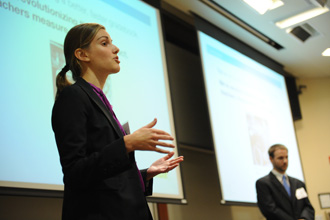TEA announces 2012 Tulane Business Plan Competition finalists
The Tulane Entrepreneurs Association (TEA) has announced the six finalists for the 2012 Tulane Business Plan Competition and Domain Companies New Orleans Entrepreneur Challenge, which together will award $70,000 in cash prizes to two promising new ventures.

The competitions will take place at the A. B. Freeman School of Business on Tulane University’s uptown campus on Friday, April 13, with the winners to be announced later that evening during the Tulane Council of Entrepreneurs Awards Gala at the Audubon Tea Room.
The Tulane Business Plan Competition, now in its 12th year, will award a grand prize of $50,000 to the most promising new venture that embodies the principles of Conscious Capitalism. In addition, competition partner and sponsor the Domain Companies will award a prize of $20,000 to the venture with the greatest potential economic impact on New Orleans.
“We received 52 applications from 18 universities in three countries for this year's competition,” said Court Robinson (MBA ’12), president of TEA. “Narrowing those outstanding entries down to six finalists was difficult, but the exceptional quality of this year’s entrants is a testament to both the growth of Conscious Capitalism and the growing reputation of the Tulane Business Plan Competition.”
The three finalists in each competition are listed below.
TULANE CONSCIOUS CAPITALISM BUSINESS PLAN COMPETITION - $50,000
Calcula, Stanford University
Calcula is developing novel urological medical devices for the removal of kidney stones without anesthesia. The opportunity is a disruption in the field of urology and has significant patient impact.
EpiQi Sciences, Brigham Young University
EpiQi Sciences is a drug repositioning firm formed to reposition an already-FDA-approved drug from its existing disease to treat anemia of chronic inflammation (ACI). After a projected three-year window to complete repositioning, EpiQi Sciences will license its patent rights to pharmaceutical companies and collect royalties over an extended 20-year patent life.
SODI-CAN, Tulane University
SODI-CAN is a dual-purpose water vessel that stores and disinfects water utilizing solar energy. The project was developed through the Tulane University School of Medicine’s Medical Science Innovation Competition in 2011 with the purpose of conceptualizing a novel method of providing clean water to people. The idea began in Tanzania, where people walk miles carrying water to-and-from water springs, only to suffer from microbial related illnesses with inadequate water disinfection. The introduction of water disinfection methods has been hindered by cost-effectiveness, design limitations, community scale-ups and cultural appropriateness.
DOMAIN COMPANIES NEW ORLEANS ENTREPRENEUR CHALLENGE - $20,000
Bideo, Loyola University
Bideo.com (bid + video) is the world’s first auction exchange for real-time trading of news video and photos. Bideo allows user-creators and citizen photojournalists to protect and sell exclusive images to news publications in a competitive bidding environment. The C2B platform combines free market dynamics, digital rights management, consumer technology and transparency to provide owners of rare, high-demand footage with the framework and tools needed to monetize big media’s soaring demand for this emerging source.
Nanofex, University of New Orleans
NanoFex, a Tulane University spinout based in New Orleans, is a for-profit company that addresses the demand for groundwater treatment by providing a novel, affordable, effective method for remediating hazardous chemicals commonly found in soil and groundwater.
ReactWell, Tulane University
ReactWell develops, manufactures and operates energy efficient underground geothermal reactor systems to economically produce and sell crude oil, bioproducts and other high-value oils, while increasing biomass growth rates. ReactWell is pioneering algae-based advanced biofuel technology by combining proven geothermal technology, bulk open-pond algae raceways, and solar energy to naturally, safely, and cost-effectively cultivate algae to produce valuable crude oil. ReactWell’s proprietary technology converts total biomass and waste into crude oil and other co-products that are cost competitive compared to conventional oils derived from fossil fuels, plants, or animal fats.
The 2012 Tulane Business Plan Competition is made possible with the generous support of the following sponsors: Domain Companies, Freeman School Graduate Business Council, Freeman School Dean’s Office, Baker Donelson, Tulane Association of Business Alumni, Tulane Business Forum, Jones Walker, Legacy Capital, New Orleans BioInnovation Center, Crescent Bank and Trust/Gary Solomon, Tulane Graduate and Professional Schools Association, Oracle Capital, Ron Ondechek Jr. and Ian Jones.
For more information about the event or to register to attend, visit http://tbpc2012.eventbrite.com/
Interested in advancing your education and/or career? Learn more about Freeman’s wide range of graduate and undergraduate programs. Find the right program for you.
Recommended Reading
- Rob Lalka
- Ukrainian scholar to discuss economic impacts of war
- Greenbaum and Altman to be honored as Entrepreneurs of the Year
- Tulane Business Plan Competition seeks conscious capitalists
- Business Plan Competition winners have a bright idea
- Finalists announced for 2010 Tulane Business Plan Competition
Other Related Articles
- Forbes: Your Pitch Deck Doesn’t Close the Deal - Your Power in the Room Does
- New Orleans startups bet on AI as Tulane expands its survey statewide in 2026
- Lepage Center honors graduating fellows
- Newsweek: Jeff Bezos May Sell up to 25M Amazon Shares
- Business Insider: Trump blasting Amazon over tariff transparency is a warning sign for US retailers
- AP News: Amazon is not planning to break out tariff costs online as White House attacks potential move
- Biotech startup breaks through at Pitch Friday
- Lepage Center announces 2025 Pitch Friday finalists
